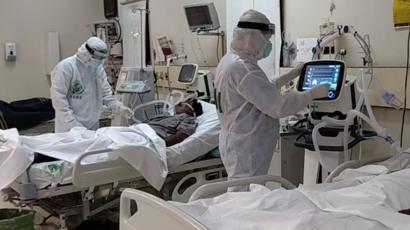By Muhammad Luqman
The number of COVID -19 cases in Pakistan may touch the alarming level of 1.2 million by end July , warned Minister for Planning, Development and Special Initiatives Asad Umar on Sunday.
The number of coronavirus positive patients in Pakistan is currently at the level of 141517 with 2647 deaths.The first coronavirus case was identified in port city of Karachi on February 26.
“Experts have projected these figures; These circumstances can be avoided if the government and the people work together to stop the virus from spreading,” Asad Umar told a news conference in the capital, Islamabad.
Umar urged the people to “get serious” and highlighted that preventive measures, including wearing face masks and practicing social distancing, can be effective in curbing the spread of the pandemic in this part of the world.
“Research [around the world] has indicated that wearing masks is a verified way of curbing the spread of Covid-19 — by up to 50 per cent,” he said, adding that the National Command and Operation Centre [NCOC] had recommended that face masks be worn by everyone at public places.
Asad Umar cautions that by the end of next month, the same number could increase to reach at 1 to 1.2 million cases@PakPMO @Asad_Umar #Covid_19 https://t.co/LffOUnAXR7
— Radio Pakistan (@RadioPakistan) June 14, 2020
“We are seeing many people wearing masks but sadly we have seen many more not wearing one. If you want to defend yourself and your loved ones, please wear masks. It is as simple as that,” he added.
The minister said that the government had issued guidelines regarding social distancing requirements that people should follow. “This [practising social distancing] is the simplest way to ensure that businesses remain open and the wheel of the economy keeps turning,” he said, adding that the failure to follow preventive guidelines would result in “people losing their livelihoods”.
He further said that that the government would start taking administrative action against those who do not follow the prescribed measures. He added that shops, transport and individuals have been fined for following the standard operating procedures (SOPs).
Umar said that a long-term lockdown is not feasible for any country and the world has also realised it now. He endorsed Prime Minister Imran Khan’s decision to impose “smart lockdowns” in virus hotspots around the country as opposed to a complete lockdown. “We have to enforce smart lockdowns in hotspots because this way we can stop the spread in areas that are witnessing outbreaks and at the same time protect jobs and livelihoods by not imposing complete lockdowns,” he said.
He also said that Punjab government would announce its strategy for actions in “hotbeds” of Covid-19. He added that the federal government would also assist the provincial government in curtailing the spread of the virus.
Talking about the healthcare system, the minister said that over 2,000 people are on oxygen support across the country and the federal government would enhance the delivery of oxygen beds in all provinces, as well as the federal capital. He added that 2,150 oxygen beds would also be provided to the provinces by the end of July.
Umar said that Pakistan was increasing its testing capacity to deal with growing Covid-19 cases. He said that currently 30,000 tests are held daily, in contrast with the 500 tests being conducted on a daily basis when the virus first emerged in the country. He added that in the next four to six weeks, Pakistan’s testing capacity is expected to increase to 150,000.
coronavirus cases in Paksitan and other South Asian countries have increased at the fastest rate , as the region becomes one of the latest pandemic hot spots.
Infections have risen by 27% in Pakistan, while Bangladesh cases spiked by 19% and 17% in India, according to data of the 20 most affected nations compiled by Bloomberg. Pakistan and Bangladesh also had their single biggest daily spike in fatalities.
Countries across South Asia have started to ease their virus lockdowns as they attempt to balance rising cases against economic misery. Pakistan had expected a peak in June but now is expecting late July or August, Prime Minister Imran Khan said in an address to the nation on June 8.
“The world has eased lockdowns since even developed countries have decided they can’t survive with a prolonged lockdown,” said Khan in a televised briefing on the pandemic, noting the restrictions had a “devastating impact on unemployment and poverty in poor countries.”















